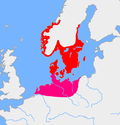Latin characters. Proto-Indo-European verbs reflect a complex system of morphology, more complicated than the substantive, with verbs categorized according... 82 KB (7,771 words) - 13:34, 25 March 2024 |
 | Proto-Indo-Iranian, also called Proto-Indo-Iranic or Proto-Aryan, is the reconstructed proto-language of the Indo-Iranian branch of Indo-European. Its... 26 KB (1,155 words) - 12:07, 19 April 2024 |
characters used to write reconstructed Proto-Indo-European words (for an explanation of the notation, see Proto-Indo-European phonology). Without proper rendering... 17 KB (1,959 words) - 23:57, 12 February 2024 |
most verbs fall into one of these categories. Suppletive verbs are completely irregular, being composed of parts of more than one Indo-European verb. There... 29 KB (2,932 words) - 16:56, 19 April 2024 |
characters used to write reconstructed Proto-Indo-European words (for an explanation of the notation, see Proto-Indo-European phonology). Without proper rendering... 104 KB (3,971 words) - 22:24, 10 March 2024 |
characters used to write reconstructed Proto-Indo-European words (for an explanation of the notation, see Proto-Indo-European phonology). Without proper rendering... 24 KB (2,855 words) - 10:47, 25 February 2024 |
characters used to write reconstructed Proto-Indo-European words (for an explanation of the notation, see Proto-Indo-European phonology). Without proper rendering... 57 KB (5,233 words) - 18:45, 11 April 2024 |
 | Proto-Indo-European society is the reconstructed culture of Proto-Indo-Europeans, the ancient speakers of the Proto-Indo-European language, ancestor of... 78 KB (9,373 words) - 06:23, 28 April 2024 |
 | The Proto-Indo-Europeans are a hypothetical prehistoric ethnolinguistic group of Eurasia who spoke Proto-Indo-European (PIE), the reconstructed common... 54 KB (6,409 words) - 15:47, 17 April 2024 |
characters used to write reconstructed Proto-Indo-European words (for an explanation of the notation, see Proto-Indo-European phonology). Without proper rendering... 48 KB (6,253 words) - 16:23, 18 April 2024 |
parent Proto-Indo-European, one for the active voice and another for the middle voice. Verbs can be conjugated in either voice, although some verbs only... 55 KB (4,722 words) - 08:34, 6 March 2024 |
 | Proto-Celtic, or Common Celtic, is the hypothetical ancestral proto-language of all known Celtic languages, and a descendant of Proto-Indo-European. It... 74 KB (4,931 words) - 00:53, 5 April 2024 |
characters used to write reconstructed Proto-Indo-European words (for an explanation of the notation, see Proto-Indo-European phonology). Without proper rendering... 28 KB (3,501 words) - 17:05, 1 April 2024 |
 | had a SOV word order. Proto-Baltic is said to have possessed certain unique traits, such as turning short Proto-Indo-European vowels *o, *a into *a,... 87 KB (5,602 words) - 21:40, 12 April 2024 |
Indo-European verbal prefix used in Indo-Iranian, Greek, Phrygian, Armenian, and Albanian, to indicate past time. The augment might be either a Proto-Indo-European... 9 KB (862 words) - 18:18, 4 April 2024 |
 | Proto-Indo-Aryan (sometimes Proto-Indic) is the reconstructed proto-language of the Indo-Aryan languages. It is intended to reconstruct the language of... 6 KB (606 words) - 20:26, 26 March 2024 |
A Proto-Indo-European (PIE) root word may be: Proto-Indo-European root noun Root aspect (root present and root aorist) in a Proto-Indo-European verb Proto-Indo-European... 300 bytes (69 words) - 19:02, 23 July 2022 |
the verb's root vowel (as in English I rise~I rose). Whereas the strong verbs are the oldest group of verbs in Germanic, originating in Indo-European, the... 60 KB (5,117 words) - 07:44, 14 March 2024 |
 | and by taking into account other Indo-European languages. Rapid development of Slavic speech occurred during the Proto-Slavic period, coinciding with the... 74 KB (7,528 words) - 22:41, 6 April 2024 |
Korean verbs Latin verbs Persian verbs Portuguese verb conjugation Proto-Indo-European verb Romance verbs Romanian verbs Sanskrit verbs Sesotho verbs Slovene... 20 KB (2,582 words) - 11:31, 2 April 2024 |



